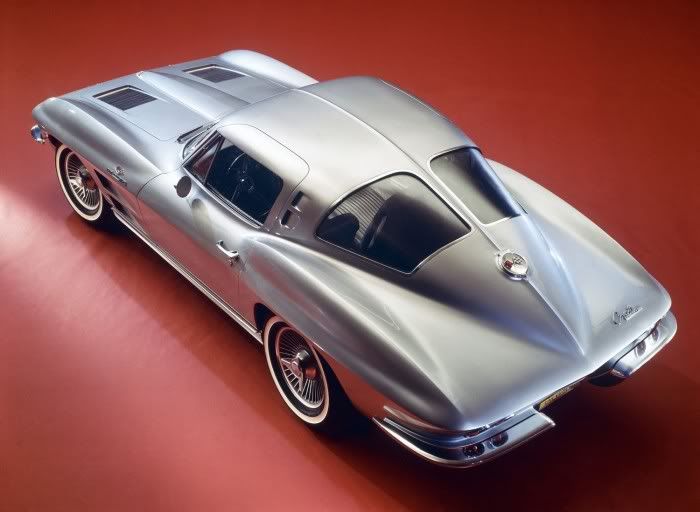One of these years, I’d like to get out to Mike Yager’s annual Corvette Funfest at Mid America Motorworks in Effingham, Illinois – preferably in a year that coincides with the purchase of a Corvette of my own. It ain’t going to be this year, however, which is too bad, because this year’s Corvette Funfest will celebrate the 50th Anniversary of the 1963 Sting Ray Corvette.
The mid-year Sting Ray coupe seems to be the one Corvette that people of all automotive persuasions agree was a design milestone. Both the name and shape were drawn from GM design boss William “Bill” Mitchell’s fascination with creatures that spend their time gliding through the ocean.
The original 1959 Sting Ray was Mitchell’s personal race car project built by Larry Shinoda, Peter Brock and Chuck Pohlman. The chassis was a tubular space frame from a Corvette SS race car, while the body was fabricated out of .125-inch fiberglass reinforced with aluminum. In the 1959 season, the car’s front and rear sections were remade in lighter .060-inch fiberglass reinforced with balsa wood. This not only carved 75 pounds off the car, but it allowed the body to flex, preventing cracks.
The Sting Ray tipped the scales at nearly 1,000 pounds less than a 1959 production Corvette and was powered by a fuel-injected 283 worth 315hp. Though its chassis and brakes had some shortcomings, Dr. Dick “The Flying Dentist” Thompson drove the car in 1960 to an SCCA National Championship in the C-Modified division. In 1961, it was retired to show car duty and Mitchell began using the Sting Ray as his driver.
Despite appearances, the Ray’s drag coefficient was relatively high at somewhere between 0.43 and 0.45, and its futuristic body actually produced a degree of undesirable aerodynamic lift. (This was rectified by using shims to jack the rear of the body slightly higher than the front.)
The influence that Mitchell and Shinoda’s Sting Ray race car had on Shinoda’s design of the 1963 Corvette is unmistakable. The bulging fenders and the stinger hood flanked by mesh grilles transferred neatly from the Sting Ray racer to the production car – though the proportions are different. The Sting Ray’s smooth front end was ingeniously duplicated on the production car with concealed headlamps that flipped up. These concealed lamps would remain a Corvette hallmark until the arrival of the 2005 C6.
Like the race car, the Corvette’s style was emphasized over function as the front of the production Corvette was prone to producing aerodynamic lift up front, despite its overall slippery appearance. This would plague Corvettes on the race track through the 1967 model year. The body of the production Corvette, while still made of fiberglass, was considerably sturdier and heavier than the race car, because of the steel substructure needed to support it.

The one-year-only split rear window used on the Corvette coupe was also a clear case of function following form. It was a stroke of design genius as it allowed the sharp crease representing the Sting Ray’s tail to continue uninterrupted (until it hit the fuel filler) to the rear of the car. Zora Arkus-Duntov famously disliked the split window design, complaining that it made the car impossible to see out of and created a distracting effect inside the car when headlamps approached from the rear at night. The Belgian-born engineer and racer was also critical of the 1963 production Corvette’s long hood, complaining that it was difficult to see over. Duntov and Mitchell clashed loudly over these now-iconic design elements, causing a rift between the two that lasted through their time working together at GM. Ultimately, only 10,594 Corvette split window coupes were made, and they remain one of the most, if not the most, popular Corvettes of all time.
At this year’s Corvette Funfest there will be a special display on the show field for 1963 Sting Rays, so it won’t be hard to pick them out among the 15,000 Corvettes expected to be on hand.
Funfest kicks off Thursday, September 13, with a Fun Run Road Tour from Mid America Motorworks campus to downtown Effingham for a street party sponsored by Effingham Convention & Visitors Bureau. Friday evening, Funfest will host a special screening of The Quest at Effingham Performance Center. The screening includes appearances by producer Michael Brown and Lance Miller as well as the chance to attend a black-tie optional cocktail party raising funds for the Chip Miller Charitable Foundation and Trail Recreation Effingham County.
As always, guests at Corvette Funfest can look forward to a Saturday night concert on Mid America Motorworks’ main stage. Other highlights for the weekend will include expert seminars, Corvette performance upgrades in the Install Dome, lifestyle products in the Fun Dome, a 5K run-walk, Celebrity Choice judging, fashion show and GM Kids in Corvettes.
Corvette enthusiasts won’t be bored and, because Mid America expects a crowd of over 40,000 Corvette enthusiasts, they won’t have to worry about not being able to find someone like-minded to talk to.
This year’s Corvette Funfest will take place September 13-16. For more information, visit CorvetteFunfest.com.